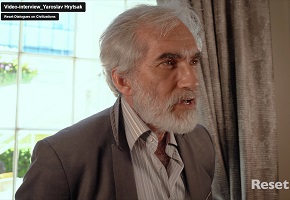The Spanish government has taken an initiative that stands in sharp contrast to the line currently prevailing in Italy and across the European Union, not to mention the United States under Trump’s leadership. While the new European Pact on Migration and Asylum, set to enter into force this June, focuses on restricting the right to asylum and on deporting migrants without residence permits, the Sánchez government is introducing an amnesty expected to apply to some 500,000 people. Spain, moreover, already has 6.6 million legal immigrant residents, compared with Italy’s 5.4 million, within a total population of 48.6 million—around 10 million fewer than Italy’s. If acceptance of immigration were truly governed by quantitative limits (the so-called “tolerance threshold”), Spain should, in theory, have less room for new arrivals and regularizations than Italy and other countries.
Analyses
Europe
- Riccardo Staglianò 11 February 2026Anselm Kiefer is the artist of ruins. Of memory. Of war. Starting with the one he wages with his gigantic works. “While I paint, my pictures undergo destruction, repair, transmutation. I massacre them, I beat them up… My mind is at war. War is within me,” he confided to Vincenzo Trione in Prologo celeste – Nell’atelier di Anselm Kiefer. But now war is everywhere; from anguished memory, it then became an all-purpose to metaphor and has now returned to being raw news. The rubble, once the backdrop to his German childhood, has become the landscape of Gaza, of Ukrainian neighborhoods, and the destruction seems not to be stopping.
- Anne-Marie McManus 29 January 2026In a recent essay published by Reset Dialogues on Civilizations, Elizabeth Suzanne Kassab called on scholars to attend closely to the forms and concerns that shape contemporary Arab thought, locating its newness in the uprisings of 2011 and the ruptures that followed. In his response, included in the broader dossier, Samer Frangie cautioned that the category of “Arab thought” functions as a “historiographical device,” one that has brought together “dispersed, contradictory, and elusive acts of” intellectual production under a shared political horizon. He thus reorients the question towards periodization: is it still meaningful—and for whom—to reinvigorate this category as a way of making sense of the present?
- Massimo Faggioli 11 November 2025The meeting between King Charles III, the Supreme Governor of the Church of England, and Pope Leo XIV, the leader of the Catholic Church, was history-making. The British monarch had met the pope before in the previous century, beginning with King Edward VII and Leo XIII in 1903, until Elizabeth II and Pope Francis met in 2014. But in the past, visits made by the British monarch to the Vatican were labelled “informal” or “private visits”, thus sidestepping the political, diplomatic, and ecumenical complications surrounding the meeting of the leaders of two officially separated (since Henry VIII’s decision in 1534) branches of the Christian family.
- A historian and political scientist, emeritus professor at Sciences Po, and holder of the BNP-BNL-Paribas Chair in “Italian-French Relations for Europe” at LUISS, Marc Lazar is one of the foremost observers of French and European politics. In his latest book, Pour l’amour du peuple. Histoire du populisme en France, XIXe–XXIe siècle (2025), he traces the roots of French populism. In Left. Crisis and Challenges of the European Left (End of the Twentieth Century–2020s) (2024), he examines the challenges facing the European left. Earlier, together with Ilvo Diamanti in Peuplecratie (2018), he described the rise of the “people” as a new central actor in politics. We meet him on the eve of the confidence vote on September 8, which could bring down the Bayrou government and usher in a new period of political and institutional instability in France.
- Besa Ismaili 11 July 2025Three decades have passed since the genocide in Srebrenica, three decades since over 8,000 Bosniak Muslim men and boys were systematically executed, while international forces, under a United Nations mandate, stood by, disabled to act.Though long delayed, the 2024 UN General Assembly resolution recognizing July 11 as the International Day of Remembrance for the Victims of the Srebrenica Genocide marked an important, yet symbolic step toward truth-telling. It seeks to institutionalize memory, counter persistent denial, and affirm the gravity of the atrocity. Yet symbolism alone cannot substitute justice.
- Alessandra Tommasi 20 June 2025“I’m ready to meet anyone, including Zelensky.” Vladimir Putin’s recent statement suggested a openness to renewed negotiations – though only “in the final phase.” But skepticism remains high in Kyiv and across Western capitals. The Kremlin’s latest proposal – disarmament, new elections, and ceding of occupied territories – was flatly rejected by Ukraine. Meanwhile, Russia continues to escalate military pressure: just last Tuesday, it launched over 440 drones and 32 missiles in one of the most intense attacks since the war began. Against this backdrop, Reset DOC interviewed historian Yaroslav Hrytsak about Ukraine’s military position, diplomatic deadlock, Western support, and prospects for peace.
- Danilo De Biasio 13 May 2025The re-election of US President Donald Trump has played a key role in prompting the launch of the ReArm Europe Plan, an initiative aimed at advancing Europe’s strategic military autonomy. Notably, the plan does not establish a common European defense force. Rather, it sets up a shared fund – worth €800 billion – to support individual EU member states’ military expenditures. To better understand the implications of this shift, Reset DOC spoke with Dan Smith, Director of the Stockholm International Peace Research Institute (SIPRI) and one of the world’s leading experts on armed conflict, defense policy, and disarmament.
- Ilaria Romano 10 May 2025According to the Center for Civil Liberties (CCL), a Ukrainian human rights organization that has been documenting war crimes since 2014 in Crimea, Donetsk, and Luhansk — and since 2022 across all occupied territories — at least 7,000 civilians are currently being held illegally. However, only 1,600 of those cases have been officially confirmed. The remaining 5,400 are listed as missing and may be in the same situation.
- Ilaria Romano 6 May 2025“The other night the sky turned completely red, something that hadn’t happened in a while. We were really scared,” says Tatiana, a former tour guide from Kyiv, who, for the umpteenth time in the past three years, was woken up by explosions. “We’re still lucky compared to those living near the front line, but since the beginning of this war, no one has been able to sleep,” she says. “Almost every night we are woken by the sound of sirens, even though we no longer go down to the subway to wait for it to end.”











